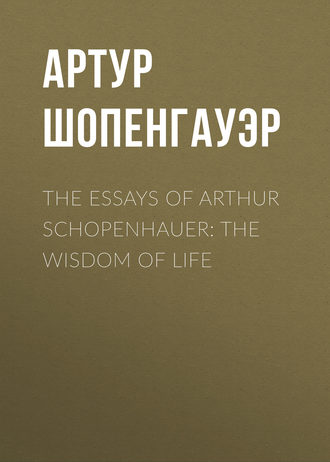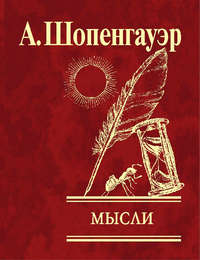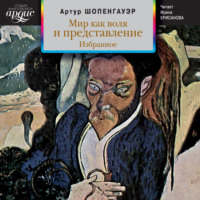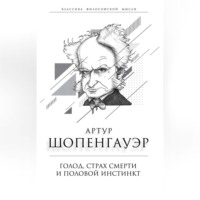 полная версия
полная версияThe Essays of Arthur Schopenhauer: the Wisdom of Life
When one goes forth a-voyaging He has a tale to tell.
And yet for all that, a personal acquaintance with celebrated travelers often remind us of a line from Horace – new scenes do not always mean new ideas —
Caelum non animum mutant qui trans mare currunt.61
But if a man finds himself in possession of great mental faculties, such as alone should venture on the solution of the hardest of all problems – those which concern nature as a whole and humanity in its widest range, he will do well to extend his view equally in all directions, without ever straying too far amid the intricacies of various by-paths, or invading regions little known; in other words, without occupying himself with special branches of knowledge, to say nothing of their petty details. There is no necessity for him to seek out subjects difficult of access, in order to escape a crowd of rivals; the common objects of life will give him material for new theories at once serious and true; and the service he renders will be appreciated by all those – and they form a great part of mankind – who know the facts of which he treats. What a vast distinction there is between students of physics, chemistry, anatomy, mineralogy, zoology, philology, history, and the men who deal with the great facts of human life, the poet and the philosopher!
1
Eth. Nichom., I. 8.
2
Cf. Clemens Alex. Strom. II., 21.
3
Eth. Eud., vii. 2. 37:
4
Probl. xxx., ep. 1
5
Tusc. i., 33.
6
For a detailed description of this condition of mind Cf Esquirol, Des maladies mentales.
7
Iliad 3, 65.
8
And the extremes meet; for the lowest state of civilization, a nomad or wandering life, finds its counterpart in the highest, where everyone is at times a tourist. The earlier stage was a case of necessity; the latter is a remedy for boredom.
9
Ecclesiasticus, xxii. 11.
10
Le Commerce, Oct. 19th, 1837.
11
Translator's Note. – Card-playing to this extent is now, no doubt, a thing of the past, at any rate amongst the nations of northern Europe. The present fashion is rather in favor of a dilettante interest in art or literature.
12
Eth. Eud, vii 2
13
Vie de Descartes, par Baillet. Liv. vii., ch. 10.
14
vii. 12.
15
Lib. 1., ep. 7.
16
i. 7 and vii. 13, 14.
17
Ecl. eth. ii., ch 7.
18
III 1073.
19
Nature exhibits a continual progress, starting from the mechanical and chemical activity of the inorganic world, proceeding to the vegetable, with its dull enjoyment of self, from that to the animal world, where intelligence and consciousness begin, at first very weak, and only after many intermediate stages attaining its last great development in man, whose intellect is Nature's crowning point, the goal of all her efforts, the most perfect and difficult of all her works. And even within the range of the human intellect, there are a great many observable differences of degree, and it is very seldom that intellect reaches its highest point, intelligence properly so-called, which in this narrow and strict sense of the word, is Nature's most consummate product, and so the rarest and most precious thing of which the world can boast. The highest product of Nature is the clearest degree of consciousness, in which the world mirrors itself more plainly and completely than anywhere else. A man endowed with this form of intelligence is in possession of what is noblest and best on earth; and accordingly, he has a source of pleasure in comparison with which all others are small. From his surroundings he asks nothing but leisure for the free enjoyment of what he has got, time, as it were, to polish his diamond. All other pleasures that are not of the intellect are of a lower kind; for they are, one and all, movements of will – desires, hopes, fears and ambitions, no matter to what directed: they are always satisfied at the cost of pain, and in the case of ambition, generally with more or less of illusion. With intellectual pleasure, on the other hand, truth becomes clearer and clearer. In the realm of intelligence pain has no power. Knowledge is all in all. Further, intellectual pleasures are accessible entirely and only through the medium of the intelligence, and are limited by its capacity. For all the wit there is in the world is useless to him who has none. Still this advantage is accompanied by a substantial disadvantage; for the whole of Nature shows that with the growth of intelligence comes increased capacity for pain, and it is only with the highest degree of intelligence that suffering reaches its supreme point.
20
Vulgarity is, at bottom, the kind of consciousness in which the will completely predominates over the intellect, where the latter does nothing more than perform the service of its master, the will. Therefore, when the will makes no demands, supplies no motives, strong or weak, the intellect entirely loses its power, and the result is complete vacancy of mind. Now will without intellect is the most vulgar and common thing in the world, possessed by every blockhead, who, in the gratification of his passions, shows the stuff of which he is made. This is the condition of mind called vulgarity, in which the only active elements are the organs of sense, and that small amount of intellect which is necessary for apprehending the data of sense. Accordingly, the vulgar man is constantly open to all sorts of impressions, and immediately perceives all the little trifling things that go on in his environment: the lightest whisper, the most trivial circumstance, is sufficient to rouse his attention; he is just like an animal. Such a man's mental condition reveals itself in his face, in his whole exterior; and hence that vulgar, repulsive appearance, which is all the more offensive, if, as is usually the case, his will – the only factor in his consciousness – is a base, selfish and altogether bad one.
21
Odyssey IV., 805.
22
Epigrammata, 12.
23
Eth. Nichom. x. 7.
24
iv. 11.
25
: Antigone, 1347-8.
26
Ajax, 554.
27
Ecclesiasticus, xxii. 11.
28
Ecclesiastes, i. 18.
29
Cf. Diogenes Laertius, Bk. x., ch. xxvii., pp. 127 and 149; also Cicero de finibus, i., 13.
30
xviii., 130-7.
31
Part III., Act 1., Sc. 4.
32
Boswell's Life of Johnson: ann: 1776, aetat: 67.
33
Translator's Note. – Schopenhauer is probably here making one of his most virulent attacks upon Hegel; in this case on account of what he thought to be the philosopher's abject servility to the government of his day. Though the Hegelian system has been the fruitful mother of many liberal ideas, there can be no doubt that Hegel's influence, in his own lifetime, was an effective support of Prussian bureaucracy.
34
Horace, Epist: II., 1, 180.
35
Let me remark that people in the highest positions in life, with all their brilliance, pomp, display, magnificence and general show, may well say: – Our happiness lies entirely outside us; for it exists only in the heads of others.]
36
Scire tuum nihil est nisi te scire hoc sciat alter, (Persins i, 27) – knowledge is no use unless others know that you have it.
37
Hist., iv., 6.
38
Translator's Note. – It should be remembered that these remarks were written in the earlier part of the present century, and that a German philosopher now-a-days, even though he were as apt to say bitter things as Schopenhauer, could hardly write in a similar strain.
39
De finilus iii., 17.
40
Disc: iii. 17.
41
Heroditus, i. 199.
42
De Constantia, 11.
43
De Constantia, 11.
44
Translator's Note. – It is true that this expression has another special meaning in the technical terminology of Chivalry, but it is the nearest English equivalent which I can find for the German —ein Bescholtener
45
Translator's Note. It must be remembered that Schopenhauer is here describing, or perhaps caricaturing the manners and customs of the German aristocracy of half a century ago. Now, of course, nous avons change tout cela
46
Translator's Note. These and other remarks on dueling will no doubt wear a belated look to English readers; but they are hardly yet antiquated for most parts of the Continent.
47
litteraires: par C. Durand. Rouen, 1828.
48
Bk. IX.
49
Diogenes Laertius, ii., 21.
50
Ibid 36.
51
Diogenes Laertius, vi. 87, and Apul: Flor: p. 126.
52
Cf. Casaubon's Note, Diog. Laert., vi. 33.
53
Translator's Note. The story to which Schopenhauer here refers is briefly as follows: Two gentlemen, one of whom was named Desglands, were paying court to the same lady. As they sat at table side by side, with the lady opposite, Desglands did his best to charm her with his conversation; but she pretended not to hear him, and kept looking at his rival. In the agony of jealousy, Desglands, as he was holding a fresh egg in his hand, involuntarily crushed it; the shell broke, and its contents bespattered his rival's face. Seeing him raise his hand, Desglands seized it and whispered: Sir, I take it as given. The next day Desglands appeared with a large piece of black sticking-plaster upon his right cheek. In the duel which followed, Desglands severely wounded his rival; upon which he reduced the size of the plaster. When his rival recovered, they had another duel; Desglands drew blood again, and again made his plaster a little smaller; and so on for five or six times. After every duel Desglands' plaster grew less and less, until at last his rival.
54
Knightly honor is the child of pride and folly, and it is needy not pride, which is the heritage of the human race. It is a very remarkable fact that this extreme form of pride should be found exclusively amongst the adherents of the religion which teaches the deepest humility. Still, this pride must not be put down to religion, but, rather, to the feudal system, which made every nobleman a petty sovereign who recognized no human judge, and learned to regard his person as sacred and inviolable, and any attack upon it, or any blow or insulting word, as an offence punishable with death. The principle of knightly honor and of the duel were at first confined to the nobles, and, later on, also to officers in the army, who, enjoying a kind of off-and-on relationship with the upper classes, though they were never incorporated with them, were anxious not to be behind them. It is true that duels were the product of the old ordeals; but the latter are not the foundation, but rather the consequence and application of the principle of honor: the man who recognized no human judge appealed to the divine. Ordeals, however, are not peculiar to Christendom: they may be found in great force among the Hindoos, especially of ancient times; and there are traces of them even now.
55
Ritterhetze
56
Accordingly it is a poor compliment, though sometimes a fashionable one, to try to pay honor to a work by calling it an action. For a work is something essentially higher in its nature. An action is always something based on motive, and, therefore, fragmentary and fleeting – a part, in fact, of that Will which is the universal and original element in the constitution of the world. But a great and beautiful work has a permanent character, as being of universal significance, and sprung from the Intellect, which rises, like a perfume, above the faults and follies of the world of Will.
The fame of a great action has this advantage, that it generally starts with a loud explosion; so loud, indeed, as to be heard all over Europe: whereas the fame of a great work is slow and gradual in its beginnings; the noise it makes is at first slight, but it goes on growing greater, until at last, after a hundred years perhaps, it attains its full force; but then it remains, because the works remain, for thousands of years. But in the other case, when the first explosion is over, the noise it makes grows less and less, and is heard by fewer and fewer persons; until it ends by the action having only a shadowy existence in the pages of history.
57
Ecclesiasticus, xxii., 8.
58
Act iv., Sc. 2.
59
Our greatest pleasure consists in being admired; but those who admire us, even if they have every reason to do so, are slow to express their sentiments. Hence he is the happiest man who, no matter how, manages sincerely to admire himself – so long as other people leave him alone.
60
Milton. Lycidas.
61
Epist. I. II.









